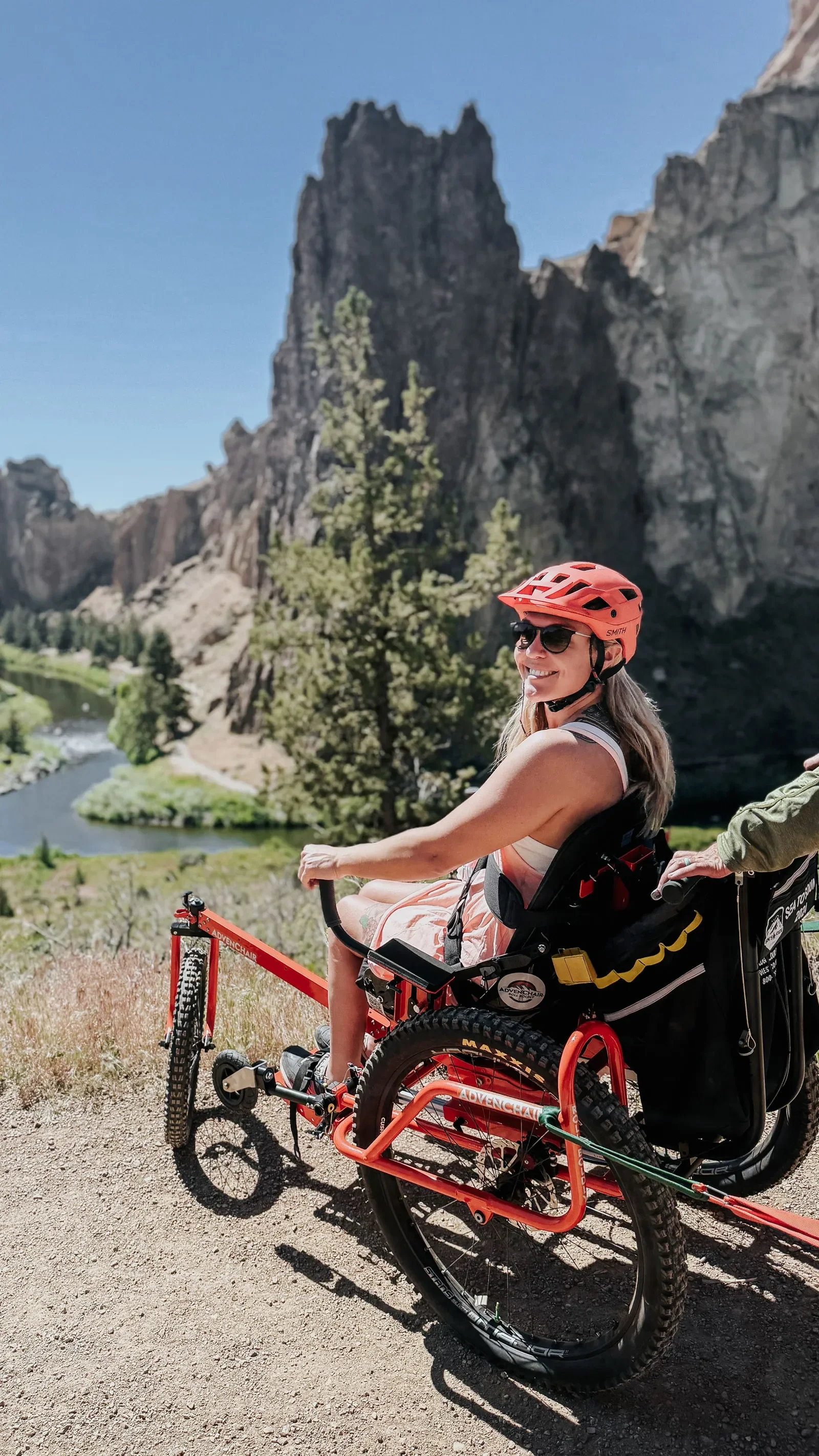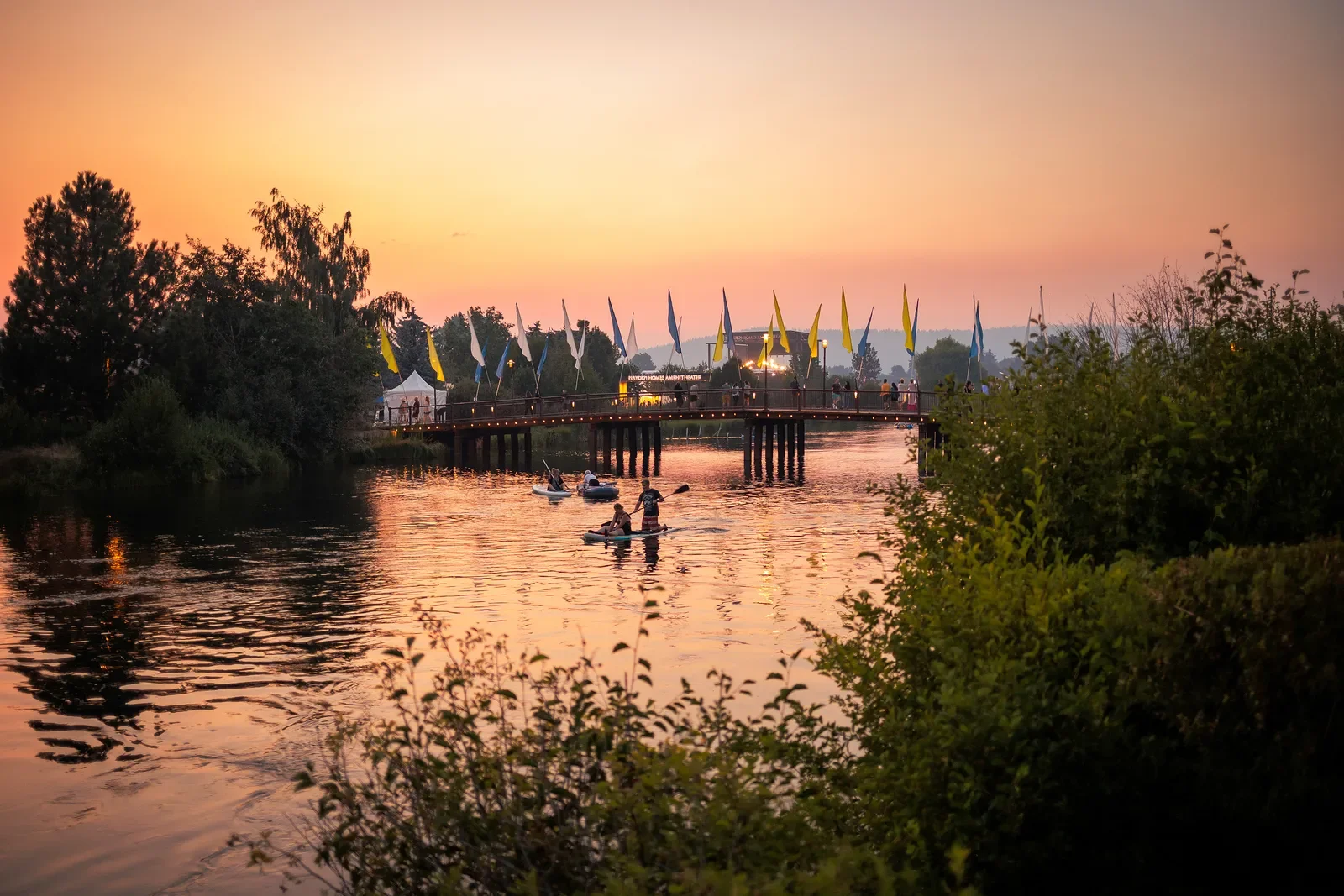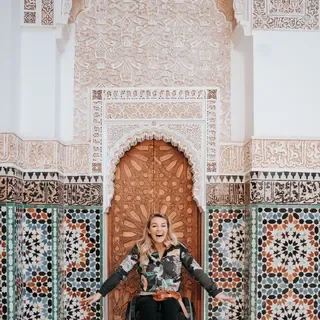In Bend, Oregon, Outdoor Adventure Belongs to Everyone
halbergman/Getty
By Sophie Morgan for Condé Nast Traveler
On a visit to this adventure magnet, Sophie Morgan goes for a trek in the high desert in an off-roading wheelchair and catches an outdoor concert, washed down, of course, with a few pints of local craft beer.
Bend, Oregon. It is one of those places people talk about with a kind of reverence. “Oh, Bend,” they’ll say, drawing out the vowel like there is a secret there that will only be revealed when you go. A renowned outdoor adventure capital, it draws climbers, kayakers, and powder chasers in droves. But as a wheelchair user, I wasn’t sure if that secret extended to people like me. Curious by nature and intrepid by design, I went to find out.
This small city, tucked into the dry side of the Central Oregon Cascades, home to just over 100,000 people, gets over 300 days of sunshine a year, yet Mt. Bachelor—just 22 miles away— collects an average of 462 inches of snow every winter. The city is hemmed in by more than 1.6 million acres of ponderosa pine forest, laced with nearly 300 miles of biking trails, and yet a mere 20-minute drive away the landscape shifts dramatically into high desert plateaus, where temperatures soar to 90°F in peak summer.
Meaning that within the span of one day, you can sip a hoppy IPA in the sunshine at one of the 30+ craft breweries (the highest per-capita rate in the U.S.), carve through alpine powder, paddle the Deschutes River, and still have time for an afternoon bike ride. The choice of outdoor activities are seemingly endless; few places offer such a surreal yet delightful expanse of climates, altitudes, and, it turns out, attitudes.
Within a few hours of arriving, I was strapped into a bright-orange, off-road wheelchair heading to one of the Bend-area’s most popular attractions, Smith Rock State Park. The AdvenChair, a uniquely human-powered, all-terrain chariot was created by Geoff Babb, a local legend who, after losing the ability to walk after a stroke in 2005, refused to be exiled from the wild, so he built his way back in. Necessity being the mother of all invention, after all.
The writer, Sophie Morgan, in an AdvenChair at Smith Rock
In and around Bend, Oregon —Sophie Morgan
Surrounded by a grinning team of able-bodied volunteers, all strapped onto the Advenchair with ropes, they prepared to lower me into what felt like the set of an epic Western. Smith Rock, a jagged, rust-red marvel shaped by ancient lava and sculpted by wind and water, rises from the Oregon desert like a sandstone cathedral. Ahead of me lay a trail that clung to the cliffside. Behind me: the rope team affectionately known as the “mules.” By all logic, this terrain should have been off-limits to someone like me. But this environment was nothing to the Advenchair, Geoff had taken it to the depths of the Grand Canyon previously.
“For me, it’s never been about conquering the trail, or the outdoors,” Geoff told me. The train of people all paused to let us talk above the Crooked River, its serpentine bend glowing in the afternoon light, a blue-winged heron glided just above the water while the canyon walls rippled in ochre and gold around us. “It’s about belonging to it and helping others feel like they do too.”
—Geoff Babb
Wanderlust Tours, one of Central Oregon’s most experienced outfitters, was guiding us both through the park. Geoff partnered with the company to extend their offering to those of us with physical disabilities, specifically people like Geoff with limited or no upper body strength. Familiar with adaptive adventures myself, I had expected adrenaline, but what I hadn’t expected was the teamwork, the way the ‘mules’ moved as one, hauling, guiding, laughing, and making the impossible feel ordinary.
“There’s something powerful about seeing a place become more accessible,” said Jared Garfield, lead ‘mule’ and one of Wanderlust’s guides. “The outdoors can feel overwhelming. That’s why the right equipment matters. But so do the right people. When you have both, you can bring more folks into places like them, especially those who’ve been told it’s not for them. We want everyone to feel included.”
This is a sentiment I would come to find implicit during my time in Bend; the values people take into the wilderness—respect, collaboration—don't disappear when they come back into town. They seep seamlessly into the atmosphere, shaping the way the city feels. And thanks to local advocates like Geoff, or local drag icon Pattie Gonia, that attitude is inclusive, enabling those of us who navigate the world differently, be that disabled, queer, or any other marginalized outdoor lover, access, an invitation to break the mould and redefine the stereotype of an outdoor lover.
Back in town, writer Tim Neville of Visit Bend showed me around the Old Mill District, once a timber hub, now a cultural centre, and into the vibrant downtown, where murals bloomed across brick walls, and record stores sat shoulder-to-shoulder with boutique shops, coffee bars and outdoor outfitters, and talked me through Bend’s long history.
Long before the climbers and cyclists arrived, this land was home to the Confederated Tribes of Warm Springs. For thousands of years, they fished and traded along the Deschutes River, which ran through the city, as it still does, like a lifeline. Bend’s modern incarnation, born in the late 1800s with the arrival of the Europeans chasing the timber trade, has now grown into a recreation capital of the Pacific Northwest. But its Indigenous history runs deeper than any trail map and can be uncovered at the brilliant local High Desert Museum.
Today, Bend’s outdoor spirit is being shaped by organizations like Wanderlust and local nonprofit Oregon Adaptive Sports (OAS) who cater for sports lovers with disabilities of all kinds. “People live in Bend because they choose to,” explains Cara Frank, OAS’s executive director, who is deaf and moved to Bend from the East Coast, despite there being a shortage of interpreters in the local area, a testament to her adoration for the place. “That makes a difference; we care about this place and therefore about who gets to access it.”
The Deschutes River, which flows through Bend, at sunset Angelo DeSantis/Getty
Cara gathers a group of OAS’s volunteers and adaptive athletes at Crux Fermentation Project, for a communal sunset. Dogs—including her own deaf pup—outnumbered people. I met Ryan Barbee, an adaptive mountain biker and fellow spinal cord injury survivor who had, like Cara, also moved to Bend because of how free it made her feel. She greeted me with trail dust on her wheels and a pint in hand. “The first thing you need to know about Bend is the community,” she said, gesturing to the crowd, where wheelchairs and mountain bikes blended in. “And OAS is the heartbeat of it.”
The food scene in Bend is also wonderfully ambitious. One standout is Hawkeye & Huckleberry Lounge, the new venture from brothers Brian and James Malarkey, who recently returned to their home state with a vision to bring a slice of ranch life into the heart of town. Set around a wood-fired oven, the restaurant has canvas tent dining, a lively outdoor patio, live music, and a menu that leans into their ranch-to-plate philosophy, with beef and produce sourced from their nearby Tumalo Ranch. Think high-quality steaks and hearty, unfussy food served with a generous dose of Oregon hospitality.
And just like the food, Bend’s music scene hits all the right notes. Later, I rolled into Hayden Homes Amphitheater, a performance venue on the Deschutes. Leon Bridges was serenading a sun-drenched crowd beneath a sherbet-orange sky while I sat comfortably in the accessible seating area, surrounded by a joyful sprawl of dancing hikers, hipsters, families, and fellow disabled folks—totally smitten.
Inclusion can be an elusive feeling for disabled people, hard to define, harder still to find. As I cruised home past the Craftsman bungalows and ponderosa pines that lined the streets, I caught myself not just longing to return but imagining a life here, and even after just a few days, feeling like I already belonged. On my final day, I sat with Geoff in his home talking about the creation of his ground-breaking chair. “A wheelchair chair powered by people?” he said. “That could only come from Bend.” I nodded in agreement, now finally in on the secret.
Where to Stay
The Oxford Hotel is an eco-luxury boutique hotel in the heart of downtown Bend; it’s ideal for walking or rolling to nearby shops and cafés. For a modern, pet-friendly place to stay, check out Element Bend. It’s located just off of Pioneer Park and very close to the Deschutes River, which winds through the city. Just outside town you’ll find the Tetherow. This upscale resort is tucked between forest and fairway. Stylish, accessible accommodations, and mountain views make it a peaceful retreat after a day spent outdoors.
Where to Eat and Drink
The lively downtown outpost of Thump Coffee is a community hub for coffee lovers—it’s step-free and just the spot for either a quick on-the-go espresso or a slow morning spent with a cardamom latte and a flaky pastry. Drake, a downtown bistro, serves American comfort food with fresh, local ingredients: the deviled eggs, burger, and seasonal cocktails are must-orders. A globally inspired restaurant born from a food truck, Spork is now one of Bend’s most popular spots and loved for its street food fusion and a laid-back vibe: don’t miss the spicy pork noodles. Wood-fired mains, creative cocktails, and live music in the dining area make Hawkeye & Huckleberry Lounge a standout for dinner. The riverside Deschutes Brewery is the original Bend brewery and still the most iconic, serving a large selection of craft beers and tasting flights alongside pub classics in a relaxed, accessible setting. Crux Fermentation Project, a beloved brewer-owned spot with panoramic mountain views, has a rotating menu of small-batch beers, food trucks, and a lively, accessible outdoor lawn. Check it out at sunset.
The author, Sophie Morgan in Morocco
Sophie Morgan
After training in Fine Art at Goldsmiths College, Sophie turned to broadcasting, a career that gave her a ticket to travel the world. As a TV Presenter, Producer, travel writer and ambassador for brands such as Airbnb, CanAm and PADI, Sophie, recently selected for Women Who Travel's Power List, is on a quest to find the perfect accessible space. Her bucket list includes adapted mountain biking in the Rockies and, one day, riding around the world on her Ryker.





